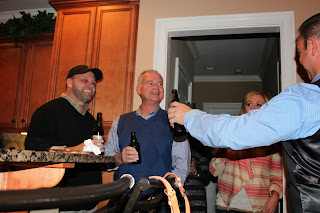On November 20th we had our big annual cardiac appointment at Vandy and it went so well! But, between that appointment and the next one (unanticipated), we got good and not as good news.
The first thing they did when we got there was an echocardiogram. It took about 30 minutes and Max was not happy about it, at first. After about 15 minutes, he agreed to cooperate and then he could not have been any better for the whole 3 hours we were there. He layed perfectly still and quiet and watched cartoons while the tech did the echo.
Afterward, we met with the nurse and she measured his height and weight, did vital signs, and then did an ekg. He is fascinated with stickers right now, so that worked to our advantage with as many stickers and wires that were attached to him that day. Max measures 2 feet 11 inches tall and weighs 27 pounds.
taking vital signs
EKG
Then we met with the pacemaker nurse and she tested how his pacemaker is working. At one point, she turned the pacemaker off and his actual heart rate was 55 bpm. She then decreased his previous setting from 100 bpm to 90 bpm.
After that, we met with Dr. Radbill, Max's electrophysiologist. We absolutely adore him! He takes his time explaining his findings and then does a great job teaching us about what he sees. I always have a lot of questions and he gladly answers all of them without making me feel like a crazy mom.
He gave us excellent news and we were absolutely thrilled to know that Max won't have to have his pacemaker replaced this year. By all their predictions, we've been told for the past few years that Max would have to have a pacemaker change sometime between his second and third birthday. We were fully prepared at this appointment to set a surgery date, but Dr. Radbill said we have enough battery life left to last at least another year or more. We were thrilled! He said that his heart is functioning very well and the pacemaker is working well also.
He sent us home with a portable heart monitor, called a holter monitor. Dr. Radbill wanted to be able to monitor how his heart is functioning for a whole 24 hour period instead of just seeing a few minutes of how his heart is working.
This is the nurse explaining to us how to use the device and what to do.
Max had to wear this heart monitor at all times for 24 hours and I had to record what he was doing and when he switched activities during that 24 hour period. I was really nervous about trying to get a two year old to cooperate, but he couldn't have done any better! He just accepted that it was what he was supposed to do, and he never tried to take it off. Then we packaged it up, sent it back to Vandy, and waited for results...
After almost 2 weeks, Dr. Radbill called me and said, "Amy, I don't want to alarm you, but I just got the results back from the 24 hour monitor and I don't like how they look. It's not an emergency, but I want to see Max today to adjust his pacemaker settings." So, I called Tyler, we picked Max up from school early, and went back to Vandy.
The sweet boy knows the routine is always so good and cooperative when we go. It almost broke our hearts when the nurse came in the room because he immediately lifted up his shirt for her to put the EKG leads on. She didn't even have the stickers out yet.
Basically, Dr. Radbill told us that his heart is skipping lots of beats because the lead (wire stitched to his heart) is going bad. The pacemaker is telling his heart to beat, but the impulse from the pacemaker is not reaching his heart tissue and therefore it's not stimulating it to contract. He ran several tests on the lead and they were all trending down which is consistent with a failing lead. So, he adjusted several settings in order to help the lead work more effectively. The downside to this is that it uses more energy and therefore battery life of the pacemaker. This means that Max will have to have surgery much earlier than we thought, unfortunately. So, by the end of the visit, Dr. Radbill assured us that the pacemaker is working much more effectively and he felt much more comfortable with the settings. He said the lead still might completely fail at any time between now and a year from now. So, we are now going to do monthly pacemaker monitoring. The good news is that Max is not pacemaker dependent, so if it were to stop working, Max's heart would still beat. It would just beat at 50-60 bpm instead of 90. We would probably notice some physical changes in Max. Dr. Radbill doesn't want to do surgery unnecessarily, so we want to maximize the amount of time we still have with this pacemaker. The next one will also be lots bigger (and looks more uncomfortable), so we don't want to rush into that if we don't have to. We will just take one day at a time until then, but feel very comfortable with where we are now with things.

getting a chest X-ray
just chillin' while they made adjustments to his pacemaker settings
Dr. Radbill sent us home with another 24 hour Holter monitor, just to confirm that the pacemaker was working as well as he thought, and it was. We did the test, and a few days later he called us to let us know he was very happy with the new settings and that the pacemaker was working much better.
Round 2 of the Holter monitor























































